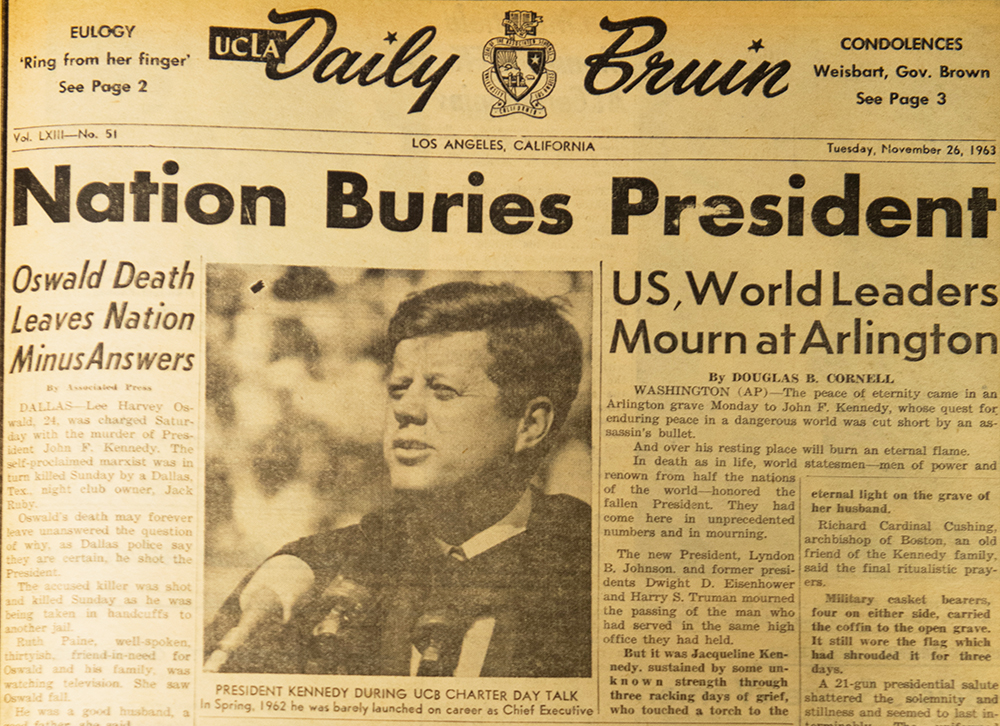Bruins remember day of loss on 50th anniversary of JFK’s assassination

There was a shout.
“The president has been shot,” a Daily Bruin staffer announced to the newsroom.
Don Harrison remembers dozens of students gathering to watch a machine print out the breaking headlines line by line. President John F. Kennedy had been assassinated.
Harrison was working as an editorial editor for the Bruin when the news came on Nov. 22, 1963.
“We were obviously stunned,” Harrison said. “It was news that was just inconceivable to anyone who heard it.”
Kennedy was shot 50 years ago today while riding in a navy blue Lincoln limo as part of a motorcade moving through Dealey Plaza in Dallas. Kennedy was scheduled to deliver a speech during a luncheon with government and business leaders just minutes away from the plaza.
At 12:30 p.m. a gunman fired three bullets from a high-powered rifle, fatally hitting Kennedy as the motorcade turned the corner. He died about 30 minutes later at a local hospital.
Today, the memory of the moment remains fresh for many members of the UCLA community.
Miki Goral, now a UCLA librarian, vividly remembers the moment she first heard about the shooting as a second-year political science student. Goral was in a large lecture hall – what is now Dodd Hall – saving her friends seats for an anthropology class when she heard the rumors of Kennedy’s death.
When her professor came in, he confirmed the news.
As Goral walked to the common room in Sproul Hall to watch the news on television, she saw members of fraternities and sororities building floats for UCLA’s Homecoming week – celebratory structures that were eventually deserted on the field, half-finished, as a result of canceled Homecoming week preparations.
The UCLA and USC football game was postponed. All classes were canceled.
“(There) was first shock and disbelief. Then, as the realization settled, tears. A lot of people hugged,” Harrison said.
The grief and shock resonated from coast to coast, thousands of miles from downtown Dallas, where Kennedy died.
Henry Kelly, now an English professor at UCLA, was in a graduate program at Harvard University when he heard the news. He said his most striking memory was watching Kennedy’s burial three days later.
Kelly said he remembers hearing on television the constant refrain of the military drum as Kennedy’s funeral went on, and 3-year-old John F. Kennedy Jr. saluting the casket of his father as it was escorted to Arlington National Cemetery.
“(It was an) extremely solemn occasion with all dignitaries of the world,” Kelly said. “There was such great pathos. I have never seen anything like it before or after.”
Kennedy’s presidency, nicknamed the Camelot era, was full of idealism and hope. He was young, handsome and had a glamorous wife, which boosted his popularity, Kelly said.
Kennedy, sworn into office in 1961, was the youngest president to be elected and the youngest president to die in office. His term is most remembered for the Cuban missile crisis, the Bay of Pigs invasion and a push for civil rights legislation.
“He really fired us up with his idealism. It was really just such an incredible loss for all of us,” Harrison said. “We didn’t understand where the country was going or what was going on. We were all in anguish.”
Barry O’Neill, a political science professor at UCLA, said he found Kennedy charismatic, but did not agree with many of Kennedy’s international policies. However, O’Neill said he appreciated Kennedy’s idealism and that the news of the assassination came as a shock.
For O’Neill, the uncertainty and confusion that followed the assassination was most significant, especially moments such as the shooting of Lee Harvey Oswald – the sniper who assassinated Kennedy – by Jack Ruby, a Dallas nightclub operator.
“Johnson’s swearing-in, (the) big state funeral with Jackie Kennedy with her little son in her hand. The news kept up,” O’Neill said. “The whole thing kept up for a month.”
For much of today’s youth, 9/11 was a turning point in their lives, but in 1963, that moment was Kennedy’s assassination, Goral said.
O’Neill said the 1960s had plenty of defining moments, chief among them Martin Luther King Jr.’s “I Have a Dream” speech to images of American soldiers in the Vietnam War. Yet the JFK assassination was the defining moment for a generation because it was the generation’s first exposure to violence, he added.
At the end of Nov. 22, 1963, however, what remained in people’s minds was a feeling of grief and despair over the loss of a president whom many dearly loved.
“We had great hopes,” Kelly said. “JFK seemed to be delivering.”


